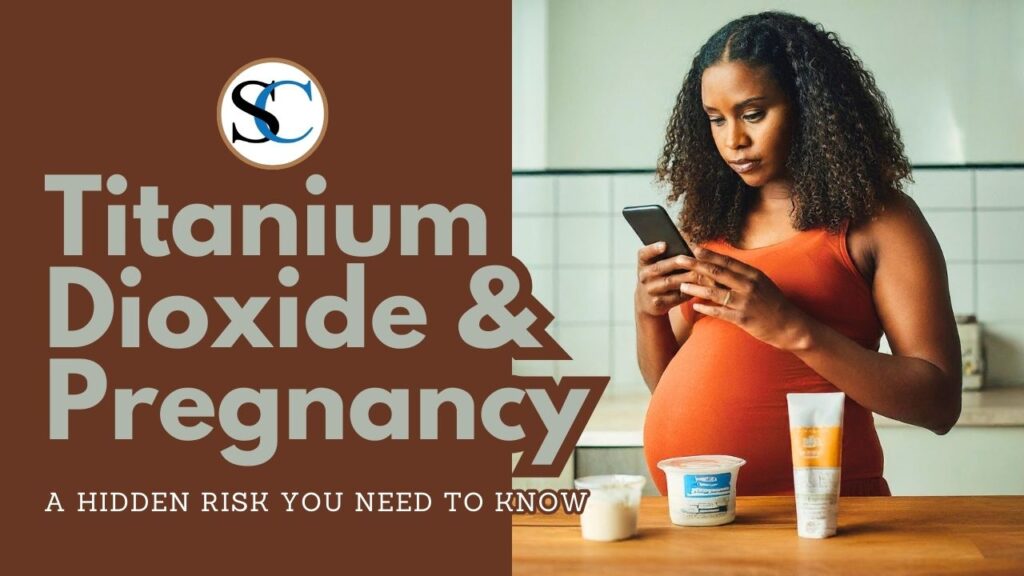Titanium Dioxide And Pregnancy: In our daily lives, we often encounter a multitude of substances without fully understanding their impact on our health and well-being. One such substance, titanium dioxide, commonly found in a variety of products, has recently come under scrutiny for its potential effects during pregnancy. But what does this mean for expectant mothers and their unborn children? This article will delve into the hidden risks associated with titanium dioxide and why pregnant women must be aware of them.
Introduction: The Invisible Ingredient
Imagine flipping through the list of ingredients on your favorite snack or cosmetic product and coming across “titanium dioxide.” It sounds harmless, right? Often considered a “safe” additive, titanium dioxide is used for its whitening and brightening abilities in foods, sunscreens, and toothpaste, to name a few. But beneath its unassuming presence lies a question mark that has preoccupied health experts and researchers: What are its implications for pregnant women?
Unmasking Titanium Dioxide: Titanium Dioxide And Pregnancy
What Is Titanium Dioxide?
- Composition: Titanium dioxide (TiO2) is a naturally occurring mineral used in various consumer products for its pigmenting and thickening properties.
- Uses in Daily Life: From cosmetics, paints, and food coloring, to sunscreens and medications, it’s a pervasive ingredient.
The Concern During Titanium Dioxide And Pregnancy

Recent studies have started to unveil potential concerns surrounding the use of titanium dioxide, particularly when it comes to pregnancy. But why is there such a concern, and what does the science say?
Scientific Evidence of Titanium Dioxide And Pregnancy
- Impact on the Immune System: Research suggests that exposure to titanium dioxide nanoparticles may affect the immune system of pregnant women, potentially leading to complications.
- Developmental Concerns: Animal studies have indicated that high levels of titanium dioxide exposure during pregnancy can affect fetal development, though extrapolation to humans requires further research.
“Despite its prevalence, the complete impact of titanium dioxide on pregnancy remains a complex puzzle that science is still trying to solve.”
Navigating the Risks: Titanium Dioxide And Pregnancy
So, what can expectant mothers do to mitigate potential risks associated with titanium dioxide exposure? Here are a few practical tips:
1. Read Labels Carefully
- Know What You’re Using: Pay attention to product labels, especially when it comes to food and personal care products.
2. Seek Alternatives
- Go Natural: Whenever possible, opt for products that use natural ingredients and display clear, titanium dioxide-free labeling.
3. Consult Healthcare Providers
- Professional Advice: If you’re concerned about exposure, your healthcare provider can offer personalized advice tailored to your health and pregnancy.
Empowering Choices for Expectant Mothers
The conversation about titanium dioxide and pregnancy is far from over, but being informed is the first step toward making empowered choices. While the scientific community continues to unravel the full story, expectant mothers can take proactive steps to minimize exposure and protect their health and that of their unborn children.
The hidden risks associated with titanium dioxide during pregnancy underscore the importance of vigilance in the face of everyday substances. By fostering awareness and promoting informed decisions, we can navigate these uncertainties with greater confidence and care.
Remember, every pregnancy is unique, and what works for one person may not work for another. Always consult with a healthcare provider for advice tailored to your situation.
Titanium Dioxide Sun Protection: Is It Right or Best For You?







Pingback: Titanium Dioxide In Creams: What You Need To Know - Safe Climber Overseas Pvt. Ltd.